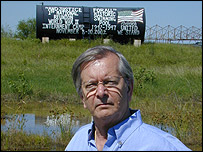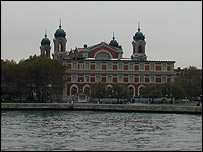
 |
|
| Home | The lost voices of Crystal City
|
 |
|---|
Eric still struggles to understand why his family was interned |
The road to Crystal City is a long, hot one. Two hours south from San Antonio, Texas.
For Eric Gehrmann, behind the wheel, this is an emotional as well as a physical trip. There is a tear in his eye as we arrive.
Because Crystal City - these days a small dusty town sporting one or two petrol stations for passing motorists - was, during World War II, the site of a vast internment camp for Germans and German Americans alleged, by the US authorities, to be Nazi sympathisers.
"I was five years old and I spent a year here with my family, six more in Germany," he says, as we climb from his car at an empty patch of open ground, pocked with the foundations of old buildings. This was the internment camp.
"It affected me a lot," he says, looking around, his wife at his side.
"The whole thing didn't make any sense, why we were here. We didn't do anything. It was just stupid politics. That your family could be taken, to a concentration camp, that's what it was, for no reason other than because my father was German."
Deported
Eric is not alone. A growing number of campaigning German Americans are now asking for - at the least - recognition from the American government for what happened to them.
That has not so far been forthcoming. People of Japanese nationality or descent held at the same camp during the war have had a full and public apology.
A monument records that on the site. There is no equivalent marker for the Germans held.
Mr Gehrmann's experience did not begin or end at Crystal City. His story is made more extraordinary because he was held - under an agreement with the US government - in Costa Rica, where the family lived.
Then from Crystal City the family were taken to Ellis Island, traditionally the welcome point for immigrants into the US, and deported to wartime Germany, a country he had never visited.
Denied
Altogether 10,905 Germans and German Americans were interned in the US during World War II.
No-one doubts that, among them, there were some Nazi supporters and sympathisers. Indeed, there is controversy about whether or not the swastika was flown at Crystal City.
 |
|---|
For many Ellis Island was a welcome point - not for these German families |
But everyone I spoke to was adamant. In their household there were no sympathies with the regime of Adolf Hitler. Some believe they were interned simply because there was evidence of contact, by post, with relatives in Germany.
Karen Ebel's father, Max, now in his 80s, left Germany precisely because the Nazis were coming to power. On one of his hands there remains a scar from a fight with a member of the Hitler Youth.
His daughter, a former lawyer on Capitol Hill in Washington, is backing a bill in the US Congress to set up a study on what happened to people like her father, Eric Gehrmann and many others.
"Homes were lost when people were sent back to Germany," says Karen Ebel. "Careers were destroyed and it seems to me this story needs to be told, to make us all realise how sacred freedom is."
She looks across at her father, sitting next to her in the sitting room of her home in New Hampshire. "You know, it's a lot less about someone saying sorry than it is about someone saying, 'this happened'."
Max Ebel nods acknowledgement. He was held at an internment camp in the state of North Dakota.
In Texas, on the site of Crystal City, Eric Gehrmann is at a loss for words as he tries to trace exactly where it was that he played as a child, behind tall fences, patrolled by dogs and guards.
For these proud Americans, there is a part of their past that they feel is denied by their own government.
| Home |